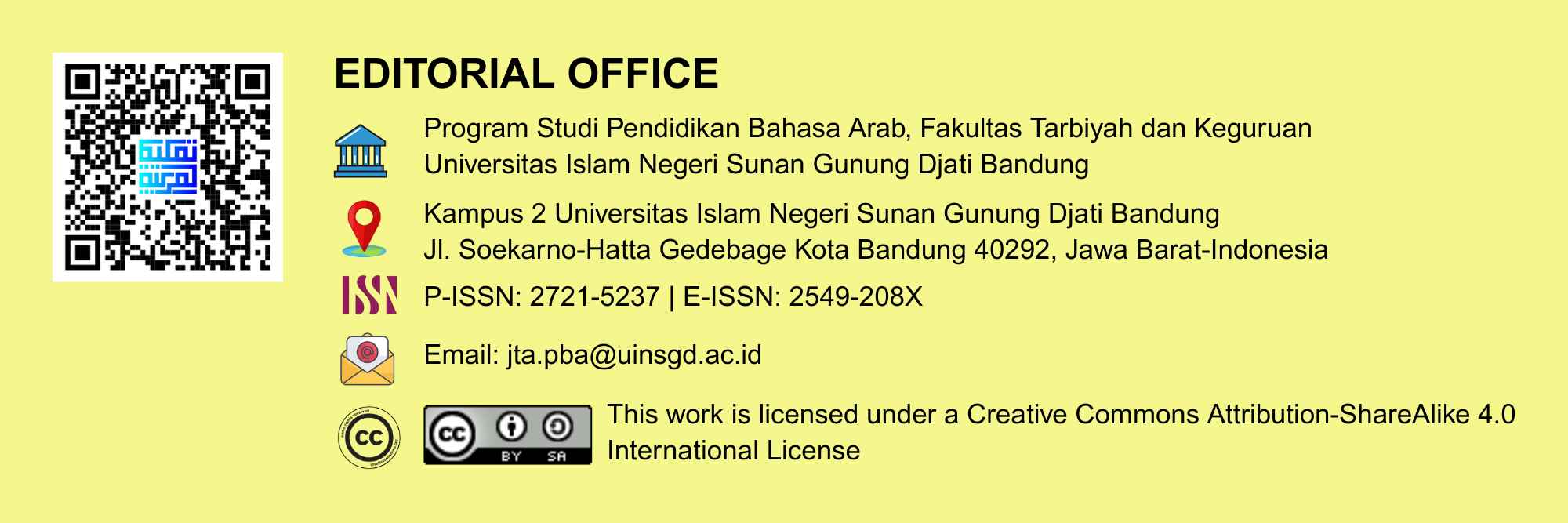Developing Professional Competence for Arabic Teachers Based on a Praxeological Approach: A Systematic Literature Review
DOI:
https://doi.org/10.15575/jpba.v8i2.38517Keywords:
Arabic Language Teachers, Arabic Learning, Praxeology, Professional CompetenceAbstract
References
Abdullah, M. R., Yaakob, M. A., Zulkifli, M. F., & Sahrir, M. S. (2023). A Review of Studies Related to Arabic Language Learning Based on the Common European Framework of Reference for Language (CEFR). Ijaz Arabi Journal of Arabic Learning, 6(2), 463-475. https://doi.org/10.18860 /ijazarabi.v6i2.20386
Al-Muslim, M., Ismail, M. F., Ghani, S. A., Nawawi, Z., Rahman, M. A., & Rostam, M. N. (2020). What Are the Features of Quality for Arabic Teachers Agreed by Students and Teachers?. Journal of Education and E-Learning Research, 7(1), 56-63. https://doi.org/10.20448/journal.509.2020.71.56.63
Al-Qatawneh, S. S., Alsalhi, N. R., Eltahir, M. E., & Siddig, O. A. (2021). The representation of multiple intelligences in an intermediate Arabic-language textbook and teachers' awareness of them in Jordanian schools. Heliyon, 7(5), 1-9. https://doi.org/10.1016/j.heliyon.2021.e07004
Downloads
Additional Files
Published
How to Cite
Issue
Section
Citation Check
License
Copyright (c) 2024 Yayan Nurbayan, Anwar Sanusi, Neneng Sri Wulan, Zawawi bin Ismail

This work is licensed under a Creative Commons Attribution-ShareAlike 4.0 International License.
Authors who publish in Ta'lim al-'Arabiyyah: Jurnal Pendidikan Bahasa Arab dan Kebahasaaraban agree to the following terms:
- Authors retain copyright and grant the journal right of first publication with the work simultaneously licensed under a Creative Commons Attribution-ShareAlike 4.0 International (CC BY-SA 4.0) License that allows others to share the work with an acknowledgment of the work's authorship and initial publication in this journal.
- Authors are able to enter into separate, additional contractual arrangements for the non-exclusive distribution of the journal's published version of the work (e.g., post it to an institutional repository or publish it in a book), with an acknowledgment of its initial publication in this journal.
- Authors are permitted and encouraged to post their work online (e.g., in institutional repositories or on their website) prior to and during the submission process, as it can lead to productive exchanges, as well as earlier and greater citation of published work (See The Effect of Open Access).
![]()
Ta'lim al-'Arabiyyah: Jurnal Pendidikan Bahasa Arab dan Kebahasaaraban is licensed under a Creative Commons Attribution-ShareAlike 4.0 International License.
Based on a work at https://journal.uinsgd.ac.id/index.php/Talim







